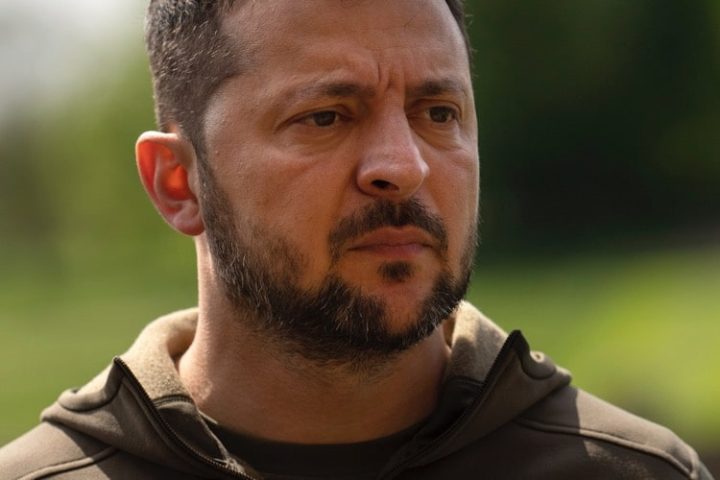
Leaked Pentagon documents disclosed that Ukrainian President Volodymyr Zelensky had planned “behind closed doors” to enter Russian cities and blow up a vital crude-oil pipeline between Russia and Hungary, despite the latter being a NATO member.
These documents encompass exchanges between Zelensky and top government officials, and divulged that Zelensky had suggested blowing up the Druzhba oil pipeline to cripple Hungarian infrastructure, which depends on Russian oil, as per The Washington Post.
The news outlet reported that in mid-February of this year during a meeting with Ukrainian Deputy Prime Minister Yulia Sviridenko, Zelensky suggested blowing up the Soviet-built Druzhba pipeline that provides Russian oil to Hungary. “Ukraine should just blow up the pipeline and likely destroy Hungarian [Prime Minister] Viktor Orbán’s industry, which is based heavily on Russian oil,” Zelensky remarked.
The Druzhba pipeline, which traverses through Ukrainian territory, still contributes a significant portion of Hungary’s oil supply. Based on figures from the Russian government, the pipeline supplied 4.9 million tonnes of oil to Hungary in 2022, besides also providing oil to other countries in Central Europe, such as Slovakia and the Czech Republic.
In response to the revelations, Hungarian government spokesman Zoltán Kovác questioned on Twitter whether it was “possible that Ukraine is plotting against a NATO country.”
Moreover, Péter Tarjányi, a Hungarian security analyst, slammed Zelensky’s suggestion as a “very unfriendly, mistaken, and stupid move,” elaborating that while he understands “that Ukraine does not like many Hungarian government actions and communications … this does not justify such a plan or idea.”
Additionally, Tarjányi pointed out that “on the one hand, Hungary has helped hundreds of thousands of Ukrainian refugees over the past 15 months, despite all the differences of opinion. We have to understand, our country sent aid, medicine, AND … in the end, voted for ALL sanctions against Russia.” Continuing, Tarjányi said that as Hungary is a NATO member, “Kyiv must explain itself very quickly. The main question is: Why did the Ukrainian president think that such a plan could be justified???? Why did he think he could risk NATO support by launching such an attack?”
The news of Ukraine’s alleged plans to target vital Hungarian infrastructure emerged one day before Zelensky traveled to Germany, where he was awarded the Charlemagne Prize, the oldest accolade granted for supposed efforts toward European unification, on May 14.
German President Frank-Walter Steinmeier, Chancellor Olaf Scholz, and European Commission President Ursula von der Leyen participated in the award ceremony in Aachen, Germany.
Lauding Zelensky and Ukraine, von der Leyen said that they were “fighting for the values and the obligation that this prize embodies.”
“In doing so,” she posited, “they are also fighting for our [Europe’s] own freedom and our values: democracy and the rule of law, free speech and the freedom to create your own destiny.”
Also, Zelensky praised the Ukrainian people and its soldiers. “Ukrainians will always make Europe stronger,” he stated.
Earlier that day, Zelensky met with Steinmeier and Scholz in his first visit to Germany since the onset of the Russo-Ukrainian conflict.
On May 13, Germany declared a new military aid package worth €2.7 billion, its largest to date. Kyiv, which is trying to obtain as many arms as possible from its Western supporters, hailed the decision.
On Twitter, Zelensky expressed gratitude to Germany, whose “air defense systems, artillery, tanks and infantry fighting vehicles” would be “saving Ukrainian lives and bringing us closer to victory.”
It remains to be seen when the 30 Leopard 1 tanks, 15 Gepard anti-aircraft tanks, more than 200 reconnaissance drones, and four Iris-T anti-aircraft systems would be transported to Ukraine.
For some observers, the recent leaks about Zelensky’s planned attacks on Hungarian infrastructure weaken the rhetoric championed by von der Leyen that Zelensky is a European unifier.
Regarding Zelensky’s award, Sahra Wagenknecht, previously a key member of the Bundestag (German parliament) for Die Linke, said that “whoever receives the Charlemagne Prize should do everything possible to end the war in Ukraine through negotiations and a compromise peace.”
Instead of giving Zelensky the award, Wagenknecht opined that it would be better if Scholz “could convince Zelensky to enable [a path toward peace] from his side.”
On a side note, Zelensky was also not invited to the Eurovision Song Contest on May 13, according to a press release by the European Broadcasting Union (EBU) on May 11.
“The Eurovision Song Contest is an international entertainment show governed by strict rules and principles which have been established since its creation. As part of these, one of the cornerstones of the Contest is the non-political nature of the event,” the EBU statement said.
The statement then elaborated, “This principle prohibits the possibility of making political or similar statements as part of the Contest.”
“The request by Mr. Zelensky to address the audience at the Eurovision Song Contest, whilst made with laudable intentions, regrettably cannot be granted,” the EBU declared.
In response to the EBU’s statement, Zelensky spokesman Sergii Nykyforov told Politico that “this is not true,” and that the “President’s Office has not applied to the organizers of the Eurovision with a request for a president to appear at the Eurovision final with the speech.”
Notwithstanding the event being non-aligned with politics, the organizers banned Russia from last year’s and this year’s events due to Moscow’s actions in Ukraine.
London expressed dismay at Zelensky’s exclusion this year, with U.K. Prime Minister Rishi Sunak’s office stating that it was “disappointed” with the EBU’s decision, based on a report by Politico.
“The prime minister believes it would be fitting for President Zelenskyy to address the events,” Sunak’s spokesperson said. “The values and freedoms that President Zelenskyy and the people of Ukraine are fighting for are not political. They’re fundamental.”



